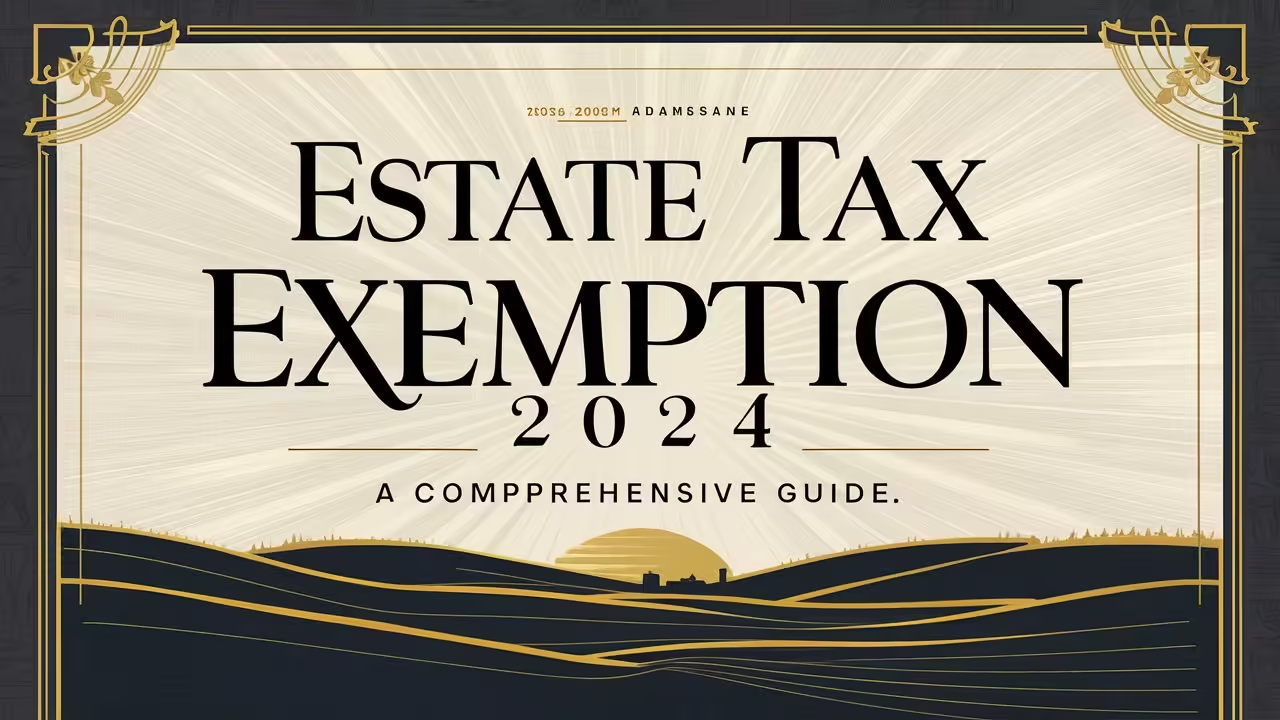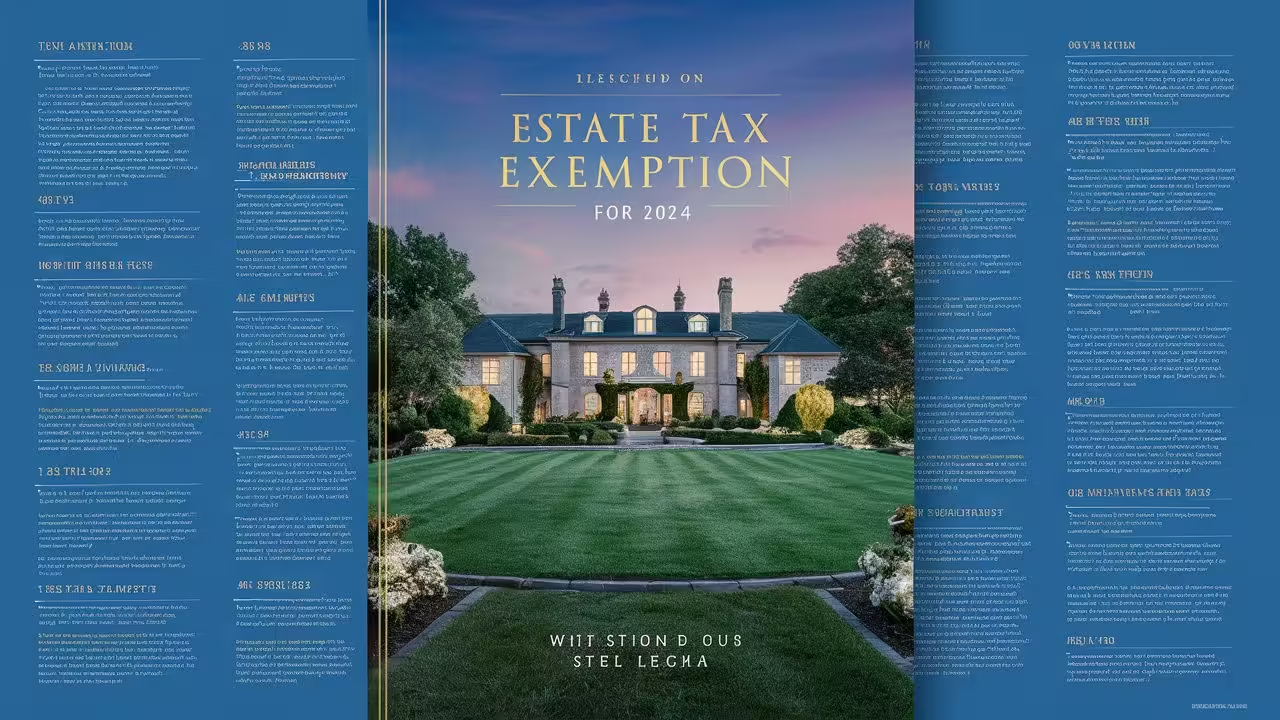Table of Contents
ToggleEstate Tax Exemption 2024: A Comprehensive Guide

Navigating the complexities of estate tax can be daunting, especially with changing laws and exemptions. As we step into 2024, understanding the estate tax exemption (estate tax exemption 2024) is more critical than ever. This guide will cover everything you need to know about the estate tax exemption for 2024, helping you plan your estate efficiently and ensure your loved ones benefit the most from your legacy.
Introduction to Estate Tax Exemption 2024
The estate tax, often referred to as the “death tax,” is levied on the transfer of the estate of a deceased person. This tax can significantly impact the amount of wealth passed on to heirs. The estate tax exemption defines the amount of an individual’s estate that is not subject to federal estate tax upon their death.
In 2024, the estate tax exemption has seen adjustments that could affect estate planning strategies. It’s essential to understand these changes to make informed decisions about your estate.
Understanding the Estate Tax Exemption
What is Estate Tax Exemption?
The estate tax exemption is the amount of an estate’s value that is exempt from federal estate taxes. Any value above this threshold is subject to estate tax, which can range from 18% to 40%. The exemption aims to protect smaller estates from being heavily taxed, ensuring that only the wealthiest estates pay significant taxes (estate tax exemption 2024).
Current Estate Tax Exemption for 2024
For 2024, the federal estate tax exemption (estate tax exemption 2024) is set at $12.92 million per individual, up from $12.06 million in 2023. This increase reflects annual inflation adjustments. Married couples can effectively double this amount to $25.84 million by utilizing portability provisions, which allow the transfer of unused exemption from one spouse to the other.
Historical Context of Estate Tax Exemption
Over the years, the estate tax exemption has fluctuated significantly. For instance, in 2000, the exemption was only $675,000. Recent years have seen substantial increases, driven by legislative changes aimed at adjusting for inflation and economic conditions.
Key Changes in Estate Tax Exemption for 2024
Inflation Adjustments
The primary change in the estate tax exemption for 2024 is the inflation adjustment. The increase to $12.92 million reflects the government’s effort to keep the exemption in line with rising costs of living. This adjustment ensures that more estates can benefit from the exemption (estate tax exemption 2024), reducing the tax burden on heirs.
Legislative Changes
While 2024 hasn’t seen sweeping legislative reforms in estate tax laws, there are ongoing discussions in Congress about potential changes. These could include adjustments to the exemption threshold or modifications to tax rates. Staying informed about these developments is crucial for effective estate planning.
State-Specific Exemptions
It’s important to note that some states impose their own estate or inheritance taxes with different exemption thresholds. For example, states like New York and Oregon have significantly lower exemption limits than the federal threshold. Understanding state-specific rules is essential for comprehensive estate planning.

Strategies for Maximizing Estate Tax Exemption
Utilizing Portability
Portability allows a surviving spouse to use any unused portion of their deceased spouse’s estate tax exemption. By filing an estate tax return (Form 706), the surviving spouse can effectively double their exemption limit, ensuring a larger portion of their estate is shielded from taxes.
Lifetime Gifting
One effective strategy for reducing estate tax liability is making lifetime gifts. The annual gift tax exclusion allows individuals to gift up to $17,000 per recipient in 2024 without incurring gift taxes. Over time, this can significantly reduce the size of an estate subject to estate tax (estate tax exemption 2024).
Irrevocable Trusts
Establishing irrevocable trusts can be a powerful tool for managing estate taxes. Assets placed in these trusts are removed from the taxable estate, potentially reducing the estate’s value and corresponding tax liability. Trusts can also provide control over how assets are distributed to beneficiaries.
Charitable Donations
Charitable donations made during one’s lifetime or at death can reduce the taxable estate. Donations to qualified charitable organizations are deductible, lowering the overall value of the estate subject to tax. This strategy not only reduces tax liability but also supports philanthropic goals (estate tax exemption 2024).
Family Limited Partnerships
Family Limited Partnerships (FLPs) can be used to transfer assets to heirs while retaining control over those assets during one’s lifetime. By placing assets in an FLP, individuals can potentially reduce the taxable value of their estate, as the valuation of partnership interests may be lower than the underlying asset values.
Impact of Estate Tax Exemption on Different Estates
Small Estates
For smaller estates, the increased exemption means that most will not owe federal estate taxes (estate tax exemption 2024). This allows for more straightforward estate planning, with less emphasis on complex tax avoidance strategies.
Medium Estates
Medium-sized estates, those valued near or slightly above the exemption threshold, need careful planning to optimize tax savings. Utilizing portability, lifetime gifting, and other strategies can ensure that heirs receive the maximum benefit from the estate.
Large Estates
Large estates, significantly exceeding the exemption limit, require sophisticated planning to minimize tax liability. Trusts, charitable donations, and strategic gifting are essential tools for these estates to reduce the impact of estate taxes.
The Role of Estate Planning Professionals
Estate Planning Attorneys
Estate planning attorneys play a crucial role in navigating the complexities of estate tax laws. They provide legal advice, draft necessary documents, and help implement strategies to maximize the estate tax exemption and protect assets for heirs (estate tax exemption 2024).
Financial Advisors
Financial advisors work closely with estate planning attorneys to develop comprehensive plans that align with overall financial goals. They provide investment strategies, tax advice, and financial planning services to ensure the estate is managed effectively.
Accountants
Accountants are essential for ensuring compliance with tax laws and optimizing tax strategies. They assist in preparing estate tax returns, managing financial records, and advising on tax-efficient ways to transfer wealth.

Common Misconceptions about Estate Tax Exemption
Estate Taxes Apply to All Estates
One common misconception is that all estates are subject to estate taxes. In reality, only estates exceeding the exemption threshold are taxed. The majority of estates fall below this limit and do not owe federal estate taxes (estate tax exemption 2024).
Portability is Automatic
Many believe that portability of the estate tax exemption is automatic. However, it requires the filing of an estate tax return for the deceased spouse’s estate, even if no tax is owed. Failure to file this return means losing the unused exemption.
State and Federal Exemptions are the Same
Another misconception is that state estate tax exemptions match the federal exemption. State exemptions often differ and can be significantly lower. It’s essential to consider both federal and state laws in estate planning.
Lifetime Gifts Always Avoid Taxes
While lifetime gifts can reduce the size of a taxable estate, they are not always tax-free. Gifts exceeding the annual exclusion amount may be subject to gift taxes, which count against the lifetime estate tax exemption.
Planning for the Future
Staying Informed
Estate tax laws can change, impacting exemption limits and tax rates. Staying informed about legislative developments and tax law changes is crucial for effective estate planning. Regularly reviewing and updating your estate plan ensures it remains aligned with current laws (estate tax exemption 2024).
Regular Review of Estate Plan
Regularly reviewing your estate plan with professionals ensures it reflects your current financial situation and goals. Life events such as marriage, divorce, the birth of a child, or significant changes in wealth warrant updates to your estate plan.
Leveraging Advanced Planning Strategies
Advanced planning strategies, such as grantor retained annuity trusts (GRATs) and qualified personal residence trusts (QPRTs), can further reduce estate tax liability. These strategies require careful planning and professional advice to implement effectively.
Estate Tax Exemption 2024: Implications for Heirs
Impact on Inheritance
The estate tax exemption directly impacts the amount of inheritance received by heirs. A higher exemption means more wealth can be transferred tax-free, benefiting heirs. Conversely, estates exceeding the exemption limit face significant tax liabilities (estate tax exemption 2024).
Planning for Successors
Planning for successors involves more than just minimizing taxes. It’s about ensuring that assets are distributed according to your wishes and that heirs are prepared to manage their inheritance. Educating heirs about financial management and estate planning can help preserve wealth for future generations.
Philanthropic Goals
For those with philanthropic goals, incorporating charitable donations into your estate plan can achieve dual objectives: reducing estate tax liability and supporting causes important to you. Establishing charitable trusts or making direct donations can be effective strategies (estate tax exemption 2024).
For more information regarding Finance Basic you can visit FinancewithAi Channel & Home

FAQs
What is the estate tax exemption for 2024?
The estate tax exemption for 2024 is $12.92 million per individual. Married couples can effectively double this amount to $25.84 million through portability (estate tax exemption 2024).
How does portability work in estate tax planning?
Portability allows a surviving spouse to use any unused portion of their deceased spouse’s estate tax exemption by filing an estate tax return for the deceased spouse.
Are state estate taxes different from federal estate taxes?
Yes, state estate taxes can differ significantly from federal estate taxes, with varying exemption thresholds and tax rates. It’s important to consider both federal and state laws in estate planning.
Can lifetime gifts reduce estate tax liability?
Yes, making lifetime gifts can reduce the size of a taxable estate. The annual gift tax exclusion allows individuals to gift up to $17,000 per recipient in 2024 without incurring gift taxes.
What role do trusts play in estate tax planning?
Trusts can remove assets from the taxable estate, potentially reducing estate tax liability. Irrevocable trusts, in particular, are effective tools for managing and distributing assets according to your wishes (estate tax exemption 2024).
How can charitable donations affect estate taxes?
Charitable donations can reduce the taxable estate by deducting the value of donations from the estate’s value, thereby lowering estate tax liability. Donations can be made during one’s lifetime or at death (estate tax exemption 2024).
Conclusion
The estate tax exemption for 2024 provides significant opportunities for individuals to transfer wealth to their heirs with minimal tax impact. Understanding the current exemption limits, leveraging strategic planning tools, and staying informed about legislative changes are essential for effective estate planning. By utilizing the strategies outlined in this guide and working with knowledgeable professionals, you can optimize your estate plan, ensuring that your legacy is preserved and your heirs benefit the most (estate tax exemption 2024).
- IRS Estate Tax Overview
- National Association of Estate Planners & Councils
- Pension Related Deduction: Boost Your Retirement Savings with 5 Catch-Up Strategies
- Traditional IRAs vs. Roth IRAs: Can You Have More Than One Roth IRA?
By following these guidelines and implementing effective estate planning strategies, you can navigate the complexities of the estate tax exemption for 2024 and secure your legacy for future generations.
Share this:
- Click to share on LinkedIn (Opens in new window)
- Click to share on Reddit (Opens in new window)
- Click to share on Tumblr (Opens in new window)
- Click to share on Pinterest (Opens in new window)
- Click to share on Pocket (Opens in new window)
- Click to share on Telegram (Opens in new window)
- Click to share on Threads (Opens in new window)
- Click to share on WhatsApp (Opens in new window)
- Click to share on Mastodon (Opens in new window)
- Click to share on Nextdoor (Opens in new window)
- Click to share on Bluesky (Opens in new window)